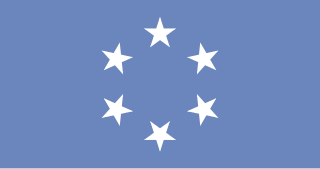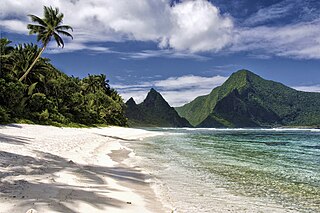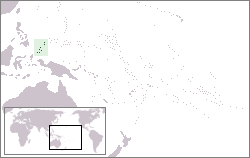
Palau, officially the Republic of Palau and historically Belau, Palaos or Pelew, is an island country and microstate in the western Pacific. The nation has approximately 340 islands and connects the western chain of the Caroline Islands with parts of the Federated States of Micronesia. It has a total area of 466 square kilometers (180 sq mi). The most populous island is Koror, home to the country's most populous city of the same name. The capital Ngerulmud is located on the nearby island of Babeldaob, in Melekeok State. Palau shares maritime boundaries with international waters to the north, the Federated States of Micronesia to the east, Indonesia to the south, and the Philippines to the northwest.

The politics of Palau take place in a presidential representative democratic republic, whereby the President of Palau is both head of state and head of government. Palau currently has no political parties and is a de facto non-partisan democracy although there is no law preventing the formation of political parties.

The Trust Territory of the Pacific Islands (TTPI) was a United Nations trust territory in Micronesia administered by the United States from 1947 to 1994.

Palau gained its independence October 1, 1994, with the entry into force of the Compact of Free Association with the United States. Palau was the last Trust Territory of the Pacific Islands territories to gain its independence. Under the Compact, the U.S. remains responsible for Palau's defense for 50 years.
In the United States, a territory is any extent of region under the sovereign jurisdiction of the federal government of the United States, including all waters. The United States asserts sovereign rights for exploring, exploiting, conserving, and managing its territory. This extent of territory is all the area belonging to, and under the dominion of, the United States federal government for administrative and other purposes. The United States total territory includes a subset of political divisions.
An associated state is the minor partner in a formal, free relationship between a political territory and a major party—usually a larger nation.

In the law of the United States, an insular area is a U.S.-associated jurisdiction that is not part of the 50 states or the District of Columbia. This includes fourteen U.S. territories administered under U.S. sovereignty, as well as three sovereign states each with a Compact of Free Association with the United States. The term also may be used to refer to the previous status of the Philippine Islands and the Trust Territory of the Pacific Islands when it existed.

The Compact of Free Association (COFA) is an international agreement establishing and governing the relationships of free association between the United States and the three Pacific Island sovereign states of the Federated States of Micronesia (FSM), the Republic of the Marshall Islands (RMI), and the Republic of Palau. As a result, these countries are sometimes known as the Freely Associated States.

Constitution Day is a holiday to honour the constitution of a country. Constitution Day is often celebrated on the anniversary of the signing, promulgation or adoption of the constitution, or in some cases, to commemorate the change to constitutional monarchy.

The Senate of Palau is the upper house of the Palau National Congress. The Senate has 13 members serving four-year terms in multi-seat constituencies. No political parties exist. The most recent election was held on 3 November 2020.

The following outline is provided as an overview of and topical guide to Palau:
Christianity is the dominant religioninPalau, although there is no state religion. Freedom of religion is enshrined in Palau's constitution, and both the government and general society respect this right in practice.

Ngerulmud is the seat of government of the Republic of Palau, an island nation in the Pacific Ocean. It replaced Koror City, Palau's largest city, as the capital in 2006. The settlement is located in the state of Melekeok on Babeldaob, the country's largest island, located 20 kilometers northeast of Koror City and 2 km northwest of Melekeok City. It is the least-populous capital city of a sovereign nation in the world.

A constitutional referendum was held in Palau on 9 July 1979. The new constitution was approved by 92% of voters, and came into force on 1 January 1981.

Lesbian, gay, bisexual, and transgender (LGBT) people in Palau face legal challenges not experienced by non-LGBT residents. Same-sex sexual activity has been legal in Palau since 23 July 2014, when the current Penal Code took effect, but households headed by same-sex couples are not eligible for the same legal protections available to opposite-sex married couples. Same-sex marriage is constitutionally banned, and there are no anti-discrimination laws concerning sexual orientation and gender identity.

A twenty-three-part referendum was held in Palau on 4 November 2008 alongside the country's general elections. Voters were asked questions on requirements of citizenship to hold office, government provision of primary school and health care, the definition of marriage and term limits for Parliament. Only the proposal permitting naturalization for certain adoptees failed to obtain the requisite majority of the vote and majority in 3/4th of the states.
The Republic of Palau has had a turbulent history over the last 450 years, with many states claiming ownership over them. Since World War II, the Islands came under United Nations' trusteeship and were administered by the United States. After becoming a sovereign state in 1994, Palau joined the UN and ratified the Convention on the Rights of the Child in 1995, the Convention on the Rights of Persons with Disabilities and the optional protocol to the latter in 2013. In 2011, the International Covenant on Civil and Political Rights in 2011 and other core human rights treaties were signed. These treaties are yet to be ratified.

Cannabis in Palau is illegal, but reports indicate the drug is widely produced and consumed on the island nation. Palau is a former Trust Territory of the Pacific Islands of the United States which gained independence in 1994, and has a population under 20,000.

The Constitution of Palau, Constitution of the Republic of Palau was adopted by the Palau Constitutional Convention from January 28 to April 2, 1979, ratified at the Third Constitution Referendum on July 9, 1980, and entered into force January 1, 1981. The Second Constitutional Convention certifies the proposed amendments to the Constitution of the Republic of Palau that were duly adopted by majority vote of the Delegates on July 15, 2005.
Palauan nationality law is regulated by the 1980 Constitution of Palau, as amended; the 1994 Palau Citizenship Act, and its revisions; and international agreements entered into by the Palauan government. These laws determine who is, or is eligible to be, a national of Palau. The legal means to acquire nationality, formal legal membership in a nation, differ from the domestic relationship of rights and obligations between a national and the nation, known as citizenship. Palauan nationality is typically obtained either on the principle of jus soli, i.e. by birth in Palau or under the rules of jus sanguinis, i.e. by birth abroad to parents with Palauan nationality. It can be granted to persons with an affiliation to the country through naturalization.










